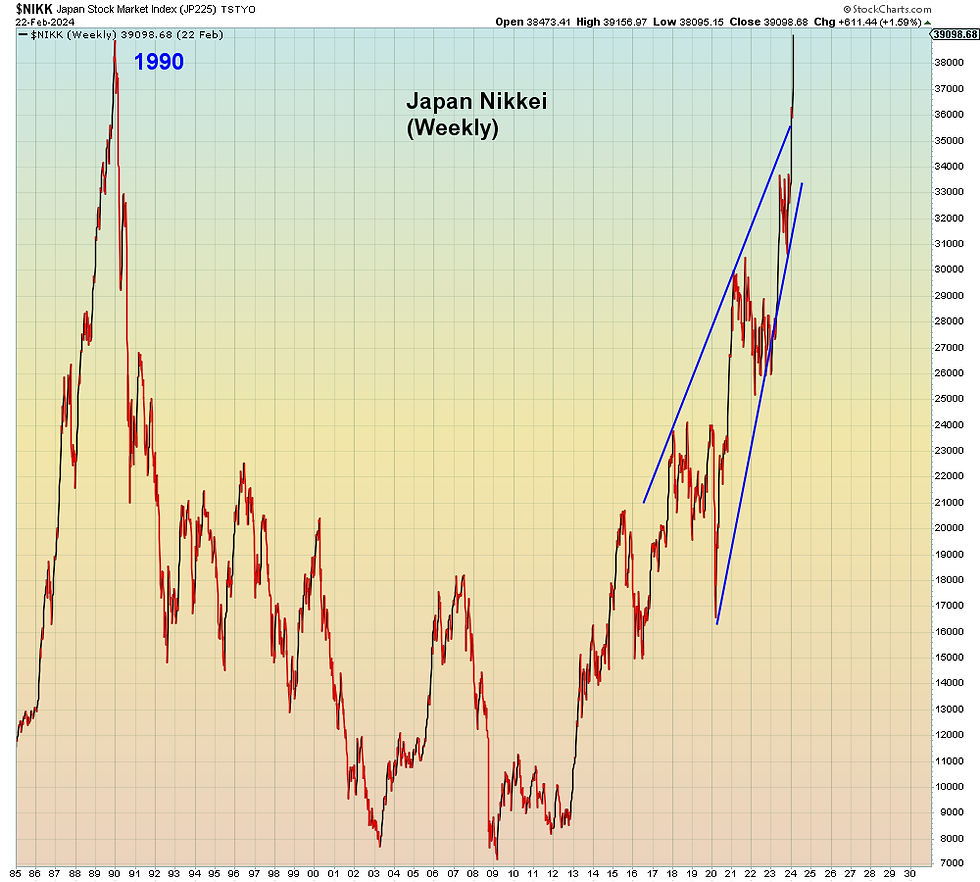Buy And Hold Is Dead
- MAC10
- Feb 25, 2024
- 3 min read
It died a long time ago. No one seemed to notice. Certainly no investment advisors.
Late Friday, Warren Buffett's Berkshire Hathaway conglomerate released their earnings report and their annual shareholder letter. As usual Buffett dispensed folksy advice on markets and warned investors to avoid the Wall Street den of thieves. One thing he usually warns about are the perils of market timing which is interesting because he is currently holding record amounts of cash. As a reminder, dollar cost averaging is a form of automated market timing in the sense that you allocate more money to stocks at market lows and less money to stocks when they're overvalued, as he admits they are now. As we will see below, he has one set of advice for himself and another for everyone else:
"Buffett told investors that Berkshire is a safe place to park their cash as long as they don’t expect the “eye-popping performance” of its past because there are no attractively priced acquisition targets out there"
Cole Smead of Smead Capital Management said Buffett is reassuring investors that “we’ll be ready to buy things when things finally get rational”
the cash continues to pile up to record levels at Berkshire because Buffett can’t find any huge investments at reasonable prices"
FR: While Buffett sits on record cash in his own portfolio, he advises individual investors to buy index funds. He is a huge proponent of indexing for everyone else, but not himself.
January 2024:
FR: What to make of this massive disconnect? Is it possible that Warren Buffett has a conflict of interest to tell the herd at large to keep buying index funds through thick and thin while he himself is essentially selling into overvaluation and buying into undervaluation?
The interesting thing about Berkshire's portfolio is that its largest holding is Apple, yet he owns no Nvidia and no AI stocks. And as we see below, even though he advocates index funds, he himself does not believe in diversification. He has almost half of his portfolio in one stock:
This is Berkshire's stock portfolio: https://www.cnbc.com/berkshire-hathaway-portfolio/
He has 85% of his portfolio in these eight stocks:
Apple: 44.5% (Yes you read that right)
Bank of America: 9.4%
Amex 8.8%
Coca-Cola 6.6%
Chevron 5.2%
Occidental Petroleum 4%
Kraft Heinz 3.2%
Moody's 2.6%
Another problem I have with Warren Buffett's "advice" is this implicit belief that the next 100 years of investing will be the same as the past 100 years of investing. Buffett invested during the greatest period of stock market returns in U.S. history. More recently, these past several years, returns have become a lot more turbulent. Why? Because markets are now almost entirely dependent upon fiscal and monetary stimulus. Which is why Wall Street hangs on every word from the Fed.
I've shown this chart several times on Twitter indicating that the market has oscillated between bull and bear market for eight years in a row. I predict that until this stimulus-addiction ends, every new market "high" will be a bull trap. And as we see below, this latest new high has yet to be confirmed.
Here's where it gets interesting...
This chart is Berkshire Hathaway. As we see it's going late stage parabolic like an AI stock. In the bottom pane, I show how many of his top holdings above (the Buffett 8) are at new highs. Currently only one stock is at a new high, American Express. So how can Berkshire be going vertical? Because the price / book ratio is currently 1.7. In other words his own stock is trading at a 70% premium to his actual portfolio.
What's even more interesting about Buffett's portfolio is that he has recently started buying Japanese stocks And of course the Japanese market is just now approaching its 34 year prior high. If anyone knows what happens when you buy and hold stimulus-dependent markets, it's the Japanese - you wait decades to get your money back.
And not everyone has that kind of time.





